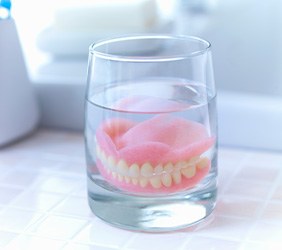Dentures – Greenville, TX
Restore Your Smile Without Breaking the Bank
It can be difficult to complete daily tasks when you are missing several, most of, or all of your teeth. Things like eating, speaking clearly, and smiling with confidence become challenging. The good news is that you don’t need to go the rest of your life with limited teeth. At Stone Street Dental, we offer customized dentures to restore your smile without breaking the break! To learn more about how dentures in Greenville can reestablish the appearance and function of your smile, contact our dental office !
Why Choose Stone Street Dental for Dentures?
- Customized for Natural Appearance
- Friendly, Experienced Dental Team
- We Accept Dental Insurance
Who's a Good Candidate for Dentures?

Dentures are a great option for people who are struggling with moderate to severe tooth loss. So, if you are missing a few teeth in a row or an entire arch, don’t hesitate to schedule a consultation with us to discuss this tried-and-true solution! In the meantime, you can read on to learn more on the topic of who is a good candidate, starting with the negative effects of tooth loss.
Effects of Missing Teeth

If you are struggling with tooth loss, then you know just how difficult eating, speaking, and other daily tasks can be. But that’s not the only reason we recommend exploring your treatment options. The gaps in your smile can also lead to several serious oral health problems, including dental drift.
The good news is that – whether you recently lost a few teeth in an accident or you’ve had gaps in your smile for several years now – there’s a good chance that we can restore your healthy, beautiful smile as well as your overall quality of life with dentures. If that’s the case, then we’ll have a custom one made for you so it looks and feels just like the real thing.
What Qualifies You for Dentures?

As we mentioned above, dentures are ideal for patients who are missing several teeth, an entire arch of teeth, or all of their teeth. Once we know the extent of your tooth loss, we can determine if you’re a candidate for dentures. If you are, then we will get to work on creating your custom restoration.
Important note: If you have any existing oral health issues, like gum disease or tooth decay, these will need to be treated ahead of time. Fortunately, we offer several restorative treatments at our office, including tooth extractions, so we can easily add the necessary care to the front end of your treatment plan!
Alternative Tooth-Replacement Options

While dentures are a tried-and-true tooth-replacement solution, there are some cases where we recommend a different one, such as:
- Dental Bridges – Dental bridges are a great option for patients who are missing one tooth. They can also replace 2-4 missing teeth consecutively! Every aspect of the restoration – from the dental crowns to the prosthetic teeth – is custom-made as well, which ensures the final result is a complete smile that looks and feels incredible.
- Dental Implants – Dental implants have skyrocketed in popularity in recent years. Since they are the only tooth-replacement solution that replaces both the root and crown of your tooth, it’s not hard to see why! They also can last for 30+ years with proper care. So, even though they require a higher upfront investment, there’s a good chance that they’ll be the best choice for your smile and your wallet.
If you’re interested in learning about your treatment options – from tried-and-true dentures to cutting-edge dental implants – don’t hesitate to schedule a consultation with us!
Types of Dentures

There are several different types of dentures out there to cater to a variety of needs. During your consultation with us, we will determine which of the following is best suited for you:
Partial Dentures
This type of denture is excellent for patients who still have some remaining healthy teeth. A partial denture fits in with surrounding teeth like a puzzle piece and is secured with inconspicuous clasps or brackets. This way, missing teeth in different locations of the mouth can be replaced with a single restoration.
Full Dentures
This traditional option replaces an entire row of missing teeth on the upper or lower arch. Instead of being held in by clasps, traditional full dentures are held in by the shape and natural suction of the mouth. They are designed to meet your unique measurements, needs, and preferences, so they look very similar to natural teeth.
Implant Dentures
Implant dentures are held into place by strategically placed dental implants. This helps when it comes to eliminating, slipping, clicking, and the need for adhesives or clasps. Implant dentures also stimulate the jawbone, reducing the amount of bone loss patients experience over time. The additional stability provided by these implants allow for patients to regain up to 70% or more of their natural chewing power. Implant dentures are designed to last for many decades, so you don’t need to worry about having them repaired or replaced in just a few years.
How Dentures Are Made

Modern dentures aren’t like the ones that your grandparents used to wear. They are customized for each patient with the highest quality of materials available. To achieve a smile that suits you perfectly, getting dentures requires a multistep process. Read on to learn more about the dentures, what they are comprised of, and the process necessary for your unique smile.
What Are Dentures Made Of?

Dentures are comprised of two main parts: the base and the replacement teeth. Here’s what each one looks like.
- Base: The base is the foundational structure of the replacement teeth. It can be made from various materials, but acrylic tends to be the most popular option because it looks so like natural gum tissue.
- Teeth: Most of the time, the replacement teeth are attached to the base of the dentures and are made from either resin or porcelain. These materials look similar to real tooth enamel.
The Denture Creation Process

All dentures are customized, so everyone’s treatment plan looks a little bit different. Here is what the process typically consists of.
- Measurements are taken of the jaw, and impressions are made of the upper and lower gum tissue. These are used to create a plaster model of your mouth.
- The model is sent to the dental lab where your dentures are created. First, your replacement teeth are set in place with an articulator. Then, adjustments are made by the lab technician.
- The wax dentures are sent to your dentist for a fitting. If everything looks and feels great, your dentures are returned to the lab so the process can be completed.
- After the dentures have returned to the lab, the wax needs to be replaced with acrylic. To do this, the lab technician places the dentures in a flask. Plaster is then poured into it to maintain the shape of the dentures. The whole flask is placed in hot water to melt away the wax.
- The plaster is cut from dentures with dental tools. Then, the dentures are placed in an ultrasonic bath to wash away the remaining texture. Excess acrylic is cut from the dentures. Then, they are polished to perfection.
- The dentures are returned to our practice. If you and your dentist are happy with the results, you can leave showing off a beautifully complete smile.
- The dentures are returned to our practice. If you and your dentist are happy with the results, you can leave showing off a beautiful, complete smile!
Adjusting to Your New Dentures

When you first get your new prosthetic, you may notice some soreness. This is normal as your mouth adjusts to your new smile. Your dentures will start to feel more natural over time. When you first get dentures, it is ideal to stick to a soft diet and exercise your facial muscles. As you become more comfortable with your dentures, you can start to introduce tougher foods. If discomfort persists or you have any concerns, give us a call.
Benefits of Dentures

Missing teeth can create unnecessary challenges in life. Whether it’s eating, speaking clearly, or smiling with confidence, when there are gaps in your smile, daily tasks many people take for granted can be extremely difficult, if not impossible. Dentures are a life-changing tooth replacement option for patients who are missing several, most, or all of their natural teeth. That’s because dentures have the ability to vastly improve your quality of life. If you’ve suffered from tooth loss, they can give your smile another chance by providing the following benefits.
Psychological Benefits

Edentulous people (people without teeth) often struggle to accept tooth loss. Along with this, it can often have negative effects on your self-esteem and social life, as well as an increased risk of experiencing sadness and depression.
Furthermore, if you’re insecure about tooth loss, you are less likely to engage in social activities, increasing feelings of sadness and isolation.
By restoring the appearance and function of your smile with dentures, you are more likely to experience an increase in confidence and self-esteem. In fact, your dentures can help reduce your anxiety about your appearance, speech articulation, chewing ability, and much more while engaging socially.
Clearer Enunciation

Missing teeth can make it much more difficult to speak. To pronounce and perform words, your lips and tongue need to be positioned properly. Without touching your tongue to your teeth, it can be very difficult to say certain words clearly.
Dentures act as your missing teeth, allowing you to enunciate properly while speaking. Following a short adjustment period and a little bit of practice, speaking clearly with them will come naturally.
Improves Nutrition

Many nutritious foods are tough in texture, including certain fresh fruits, vegetables, and healthy proteins. When you cannot properly chew your food due to tooth loss, you can experience a variety of problems including indigestion and malnutrition.
With an improved ability to chew, your dentures allow you to enjoy a more expansive diet full of nutritious foods, allowing your body to receive essential nutrients for optimal overall health.
Preserves Oral Health

If you still have any remaining natural teeth, getting dentures can help prevent them from shifting to other areas of your mouth. Your dentures can also bear some of the weight of regular chewing, therefore reducing wear and tear on your real teeth.
Expands Opportunity

Your smile is one of the very first things people notice when they see your face. When it comes to important interactions like job interviews, sales, and even getting promotions, it’s extremely important to make a good first impression, and having a complete smile is an advantage. In fact, according to a 2019 study, your probability of being employed is negatively associated with poor oral health, meaning the better the condition your smile is in, the higher your chances of having and keeping a job!
Dentures Aftercare

Dentures have a long history of successfully restoring smiles after tooth loss, but caring for them properly is essential to continue enjoying their many benefits. Even if you have no natural teeth remaining, you should still visit our team in Greenville every six months for a routine checkup and cleaning. This allows us to monitor your dental condition and restorations to catch and address any areas of concern, like early gum disease, before they become problematic.
You should also clean your prosthetics consistently to avoid potential problems. Continue reading to learn more about how to maintain your dentures, and please don’t hesitate to contact us if you have additional questions.
Removable Dentures

Remove After Eating
Wearing dentures restores a good portion of your original bite force so you can enjoy a wholesome diet of foods that support your oral and overall health. Plus, the ceramic teeth don’t develop decay like natural enamel.
However, germs in your mouth and leftover food or other debris can cling to the surfaces of your new teeth and form plaque. From there, they can penetrate your connective tissues and cause periodontal disease that can spread to your jawbone and result in decay if left untreated.
Rinsing your dentures under gently running water after meals helps remove unwanted bacteria and debris to freshen your breath and avoid potential problems.
Clean Your Restoration
You must also remove your dentures at least twice daily to thoroughly scrub all their surfaces with a soft-bristled toothbrush and clear dish soap or a special paste that won’t abrade the material. Remember to use cool or room-temperature water, because if it’s too hot, you could warp the base so it no longer fits.
Then, rinse your prosthetics to remove any cleaning materials before reinserting them in your mouth or leaving them to soak overnight.
Keep Your Dentures Safe
The acrylic base of your dentures and ceramic pontics (artificial teeth) are durable, but that doesn’t mean they’re invincible. For instance, they’re prone to becoming slippery during cleanings and might slip from your fingertips. If they fall from a great enough height or land on a hard enough surface, they might become chipped, cracked, or broken altogether.
It helps to place a soft towel beneath you when you wash them so they’re less likely to be hurt if they’re dropped. Also, if you’re not wearing them, it’s recommended that you try to keep them out of the reach of small children or pets who may not handle them carefully.
Remove Dentures When You Sleep
You might think it’s easier and more efficient to wear your dentures 24/7, but they rely on a firm suction against your connective tissues to remain firmly in place. This reduces the circulation to your gums, increasing the likelihood of developing sores that make it difficult to wear your restoration.
You are also more vulnerable to developing certain respiratory infections or gum disease, so it’s best to remove your prosthetics and leave them to soak in a glass of water or a special solution that eradicates up to 99% of germs while you sleep.
Notice Changes
Paying attention to what’s happening your mouth helps you notice changes that might require Dr. Garrad’s attention. For instance, if your gums look darker or more swollen than usual, you might have developed gum disease.
If you see chips or cracks in your dentures, you might feel tempted to fix them on your own at home with super glue or other household supplies. This isn’t usually recommended, because these materials aren’t intended for oral use and can be toxic if ingested. It’s best to contact our office in Greenville so we can provide professional repairs.
Denture FAQs

Dentures are an excellent option for patients who are missing most of or all of their teeth, but you may still have some unanswered questions, so we’re here to help. Here are the answers to some of the most common questions we receive about dentures in Greenville. If you don’t see the information that you’re looking for below, don’t worry. Give us a call and we’d be happy to tell you more about the restoration and get you started with an initial consultation.
Should I Have All My Teeth Pulled to Get Dentures?
Repairing a damaged tooth is always preferable to replacing it when possible. Tooth extractions of any kind will only ever be recommended if deemed absolutely necessary, like when a tooth is too damaged to save thanks to extensive decay, severe infection, or trauma that’s broken off most of the enamel. If all of the teeth in an arch are decayed or infected with gum disease, replacing them with dentures may be a viable option, but your dentist will always explore all of your options before recommending this.
Can I Sleep with My Dentures?
Dentists generally recommend that you take your dentures out at night when you go to bed. When you first get your dentures, you will typically be told to keep them in your mouth for 24 hours, including when you sleep. After that, you should be taking them out every evening. This is because wearing dentures restricts the circulation in your gums, therefore leading to soft tissue irritation and potentially speeding up ridge resorption. Taking dentures out gives the gums a chance to recover and get the nutrients they need during the night. Ultimately, it is better to take out your dentures while you catch some Z’s.
Will It Hurt to Get Dentures?
If you need to have teeth extracted before you can get dentures, you’re likely to experience some discomfort after the oral surgery. Take your prescribed pain relievers as directed. This discomfort should improve 3 to 5 days afterwards. When you first receive new dentures, some minor irritation may occur as your mouth adjusts to the new appliance. The amount of time this will take varies from person to person. If discomfort persists, give us a call so we can take a look.
Can You Still Eat Steak with Dentures?
Tough meats, like steak, are often difficult to chew with dentures, but it’s still possible to do so if you take all the right precautions. Pick out tenderloin and other beef cuts with less connective tissues and muscle fibers. Make sure the meat is thoroughly tenderized beforehand. Cut it into very small pieces to make them easier to manage.





